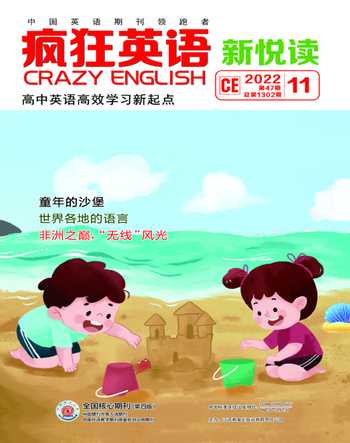决胜“人堆城堡”
李全忠
作者和他的家人、朋友一起參加他们所在城市举办的“人堆城堡”比赛,他们会成功吗?一起到文章中看看吧!
1 “Jordi! Wake up!” Dads voice calls from the hallway, and I sit up quickly. Today is the day! The day that I will finally be a casteller—a castle builder.
2 My city is hosting todays competition. Never before have I been part of the tower. It was so high. And it sometimes fell. I was hesitant to be up there. Today, for the first time in a competition, I will help build the tower!
3 In town, I see that the center of the square is already packed with people. While I am waiting for our turn to compete, my friend Tomeu comes to stand with me. “What if Im not ready for this, Tomeu?” I ask. Tomeus dark eyes sparkle as he smiles at me. “We are never ready, Jordi. None of us who compete knows for sure how it will go.” He gestures towards the tower going up in front of us. “Just like these people, you must have faith in others. You must trust those below who lift you up, and you must trust yourself.” Tomeu pats me on the shoulder. “Have focus. Have faith.” I nod to show that I understand. I will do my best to follow his suggestions. Soon, too soon, it is our turn.
4 Dad and several strong men make the base for our tower. Four smaller men create a strong second level. Our tower is growing taller and taller. I watch as Mom climbs nimbly (敏捷地) up. She and my aunt form the fifth level.
5 Then suddenly it is my turn. Tomeu and I will make up the sixth level. Each of the castellers wears a waist belt, and I hold the belts tightly with my bare toes as I climb up. I pass the first two levels without difficulty, but as I go higher, the tower feels less steady. By the time I reach the fifth level, nerves make my hands sweat and my knees tremble, for I am very high off the ground.
阅读上面的短文,根据所给情节进行续写,使之构成一个完整的故事。
注意:
1. 所续写短文的词数应为150左右;
2. 续写部分分为两段,每段的开头语已为你写好。
Paragraph 1:
I place my foot into Moms waist belt and try to stand, but it slips off.
Paragraph 2:
Tomeu and I grasp each others arms, and our tower is complete.
写作导引
一、语篇研读
(一)基本要素
[Where In 1. city When Today Who Jordi: having never been part of the tower before 2. it was so high
Tomeu, Jordis friend: 3. Jordi a lot
Jordis dad and several strong men: 4. the base for their tower
Jordis mom and aunt
What They joined a competition, and 5. finally. Why Because they 6. in each other and focus on the task. ]
(二)主題探索
What is the text about? And what does the author want to tell us?
二、语言学习
(一)词块
[Expressions Chinese meanings 1. sit up 2. be hesitant to 3. be packed with 4. stand with 5. what if 6. for sure 7. have faith in 8. lift up 9. do ones best 10. make up ]
(二)句式
1. 倒装句
Never before have I been part of the tower. (Para. 2)
我以前从来没有成为这座塔的一部分。
2. 宾语从句
In town, I see that the center of the square is already packed with people. (Para. 3)
在城里,我看到广场的中心已经挤满了人。
I nod to show that I understand. (Para. 3)
我点头以表明我理解。
3. 状语从句
Tomeus dark eyes sparkle as he smiles at me. (Para. 3)
当Tomeu对我微笑时,他黑色的眼睛闪闪发光。
I watch as Mom climbs nimbly up. (Para. 4)
我看着妈妈敏捷地爬了上去。
Each of the castellers wears a waist belt, and I hold the belts tightly with my bare toes as I climb up. (Para. 5)
每个人堆城堡的参与者都系着腰带,当我爬上去的时候,我光着脚趾,并用脚趾紧抓着腰带。
4. 定语从句
None of us who compete knows for sure how it will go. (Para. 3)
我们这些竞争的人都不能确切知道它会如何发展。
You must trust those below who lift you up, and you must trust yourself. (Para. 3)
你必须信任下面那些举起你的人,而且你必须相信自己。
(三)即学即用
1. 我绝对不会忘记你和我们在一起的日子。(使用倒装句)
2. 就在这时,我第一次注意到我们的主人穿着他那件漂亮的绿色外套,戴着他那顶黑色的丝绸帽子。(使用宾语从句)
3. 当我在车站等车的时候,我听到一阵很大的声响。(使用状语从句)
4. 只有那些发出自己声音的人才能争取到权利。(使用定语从句)
三、续写技能
读后续写中,情绪描写有两种方法:一种是直接描写法,即句子中直接出现表达情绪的单词;另外一种是间接描写法,通过表情和动作来体现某种情绪。大部分读后续写的故事中,人物是从“负向”情绪,最终转化到“正向”情绪的。
●“负向”情绪之恐惧、绝望
恐惧:
1. He turned to me, with his eyes full of horror. 他转向我,眼中满是惊恐。(间接描写)
2. Realizing what had happened, a flood of fear welled up in him. 意识到发生了什么,一阵恐惧涌上他的心头。(直接描写)
3. At the sight of the wolf, I froze with terror. 一看到狼,我吓得僵住了。(间接描写)
4. At the sight of the wolf, I felt that my throat tightened and my knees felt weak. 一看到狼,我感到喉咙发紧,膝盖发软。(间接描写)
绝望:
1. Tony felt hopeless/desperate. 托尼感到绝望。(直接描写)
2. Tony was suddenly thrown into a world of darkness and sank into hopelessness. 托尼突然陷入了一个黑暗的世界,并且陷入了绝望。(间接描写)
●“正向”情绪之快乐
1. Seeing her present, she was overflowing with happiness. 一看到她的礼物,她充满了幸福。(直接描写)
2. Joy welled up inside her. 她心中涌起了喜悦。(直接描写)
3. Hearing this, everybody was wild with joy. 一听到这句话, 每个人都欣喜若狂。(直接描写)
4. To his joy, his son won first prize in the English Speech Contest. 令他高兴的是,他的儿子在英语演讲比赛中获得了一等奖。(直接描写)
5. Laughter lingered around the room. 笑声在房间里萦绕。(间接描写)
6. She laughed, with her eyes shining with excitement. 她笑了,眼睛里闪烁着兴奋的光芒。(间接描写)
7. Her face lit up/brightened/glowed with pleasure when I gave her the present. 当我给她礼物时,她的脸上焕发出了光彩。(间接描写)
8. A bright smile appeared on/spread across her face when she saw the present. 当她看到礼物时,她的脸上露出了灿烂的笑容。(间接描写)
四、续写布局
根据续写第一段的段首句“我把脚放进妈妈的腰带里,试着站起来,但脚滑脱了。”可知,第一段内容应描写活动中出现的一些状况。再结合续写第二段的段首句可知,“我们”的塔完成了。由此倒推,“我们”并没有因为突发状况而放弃。因而,续寫第一段还可以描写“我们”的应对措施。具体情节发展,可根据以下问题链推测:
1. How do I feel?
2. What do I do next?
3. How do my team members react?
根据续写第二段的段首句“Tomeu和我抓住彼此的胳膊,我们的塔完成了。”可知,“我们”的人堆城堡建得非常成功。“我”会有哪些情感变化和感悟呢?具体情节发展,可根据以下问题链推测:
1. How do I feel at that moment?
2. What lesson do I learn from this experience?

